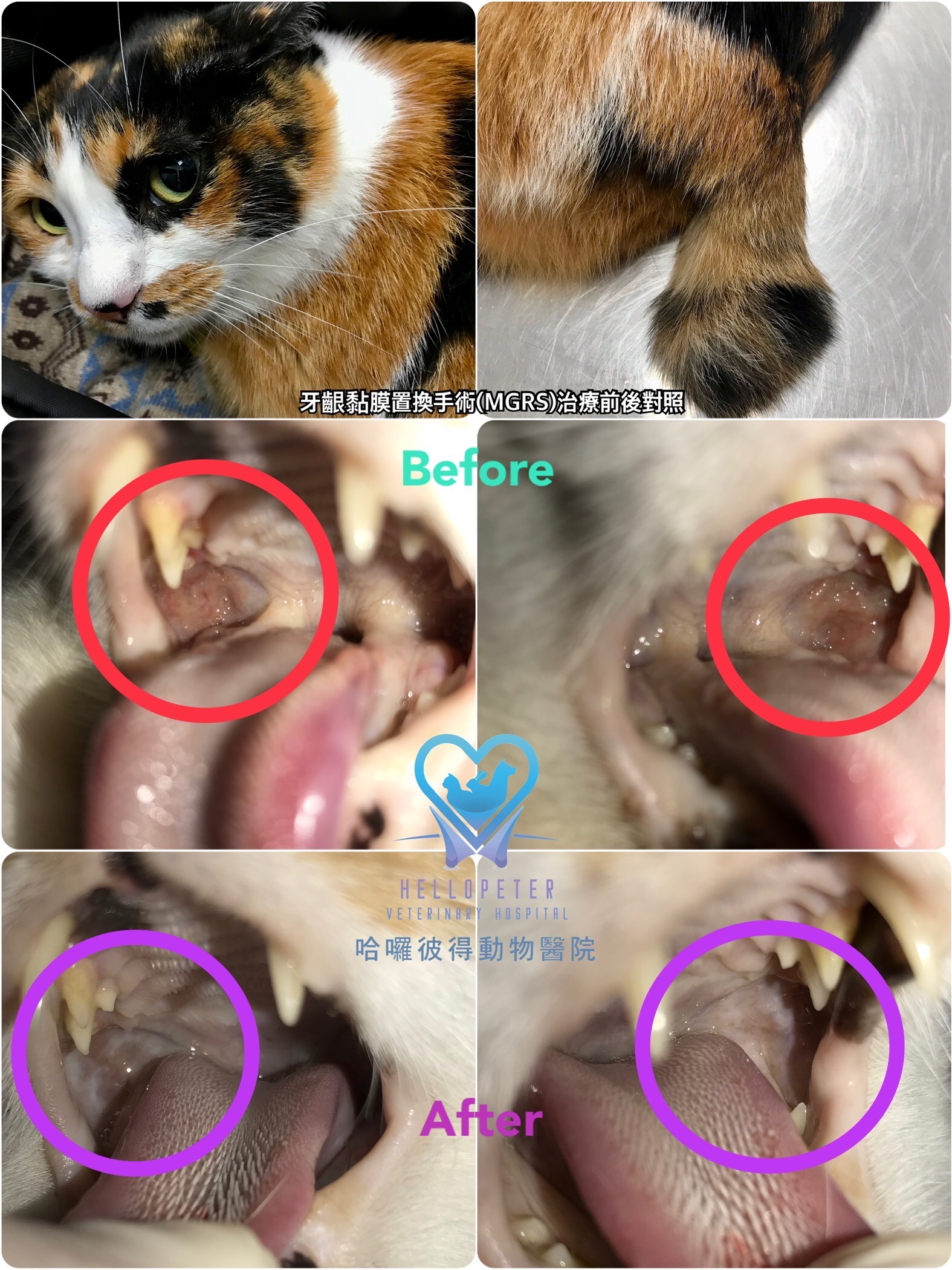Added on December 6, 2022: Successful Mucogingival Replacement Surgery (MGRS) for a 3-year-old calico cat with stomatitis, resulting in recovery.

2022/12/06 New Patient
“Haru” is a mixed breed calico female cat who specially come to our hospital from Miaoli. She was 3 years old when she started mucogingival replacement surgery (MGRS) for feline chronic gingivostomatitis (FCGS, hereinafter referred to as stomatitis) at our hospital, and she was 3 years and 4 months old when she finished the treatment.
The patient was very afraid of pain. Before coming to our hospital, FCGS had seriously affected the patient’s appetite and scratched her mouth frequently. Another hospital used steroids to control the symptoms of stomatitis and maintain appetite, however, the above-mentioned symptoms will recur every time the medicine is stopped. The owner also tried dental scaling in another hospital, but the condition did not improve.
Because the owner does not want to use any medicines to control and strongly hopes to save her teeth, we conducted a preoperative blood test to confirm that the complete blood count (CBC), blood biochemistry (such as liver and kidney, etc.), and the heart failure (NT-pro BNP) examination were normal, after that we assessed the patient for mucogingival replacement surgery (MGRS).
Haru's spirit and appetite immediately improved significantly after starting the MGRS treatment. After 4 months of treatment, we successfully cured the cat's stomatitis and preserved the teeth, and she maintain a good spirit, appetite and vitality.
Feline chronic gingivostomatitis (FCGS) is one of the common oral diseases in cats. The main symptoms are:
- The gingiva and oral mucosa are red, swollen, ulcers or hyperplasia. All soft tissues in the mouth, including the gingiva and all parts of the oral mucosa (including buccal, lingual, sublingual and oropharynx, etc.), will have redness, ulceration or hyperplasia.
- Cats will lose their appetite or even refuse to eat because of mouth pain, or they will keep shaking their heads and scratching their mouths with their front feet when eating and drinking.
- The patient's saliva usually has a peculiar smell, even putrefactive odor, due to ulcers.
At present, the most common treatments are long-acting steroid injections or oral steroids, combined with antibiotics, and tooth extraction, etc., but the effect of individual treatment varies greatly, furthermore, tooth extraction will likely cause the cat's oral cavity to collapse and alveolar bone loss. They need lifelong medication and can't stop it.
Dr. Chung-Wei Chen's original Mucogingival Replacement Surgery (MGRS) aims to solve the above-mentioned sequelae and difficulties in the treatment of stomatitis, and make cats with FCGS no longer need to take medicine for a long time after recovery, and return to the normal life they had before the illness.
If you want to see more cat patients cured by MGRS in our hospital, please refer to our official website
(www.hellopeter.com.tw/contents-4. html) or Facebook fan page album (
www.facebook.com/media/set/?set=a.1308046286294231&type=3).
HelloPeter Veterinary Hospital
Director |Dr. Chung-Wei Chen (Dr. Richard Chen)
Column: 【Dr. Chen Talks About Teeth and Oral Cavity】
www.hellopeter.com.tw/contents-3.html
Phone: +886-4-2472-8828
Address: No. 29, Sec. 2, Dongxing Rd., Nantun Dist., Taichung City 408, Taiwan
Official Website:
www.hellopeter.com.tw
Hospital Hours: Monday to Friday 10:00~20:00 (by appointment only), 12:00 to the end of all appointments on Saturday, Closed on Sunday
#
陳重威獸醫師 #
哈囉彼得動物醫院 #HellPeterVeterinaryHospital #
動物牙科推薦 #
寵物牙科推薦 #
牙齦黏膜置換手術 #
mucogingivalreplacementsurgery #
MGRS
#貓 #
貓口炎 #
口炎貓 #
cat #
dog
#
動物口腔外科 #
獸醫牙科 #
pet



